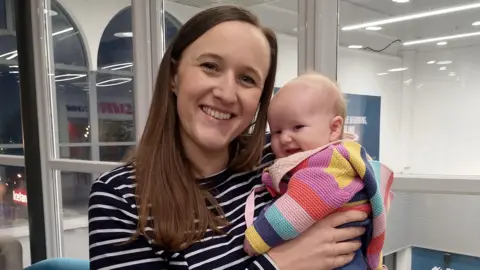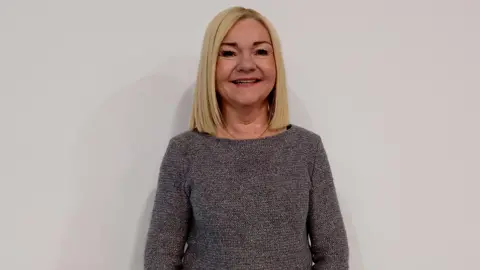'I didn't think I would ever sit down and enjoy a Christmas meal'
 BBC
BBC"I'd describe Christmas as the perfect storm for someone suffering from an eating disorder - so many factors come together that make it really difficult - with food being the obvious one."
That's according to Paula Gibson, from Freed Beyond, a social enterprise that gives support to those suffering from an eating disorder.
"With an eating disorder food is not the issue – but food then gets used as the substance to numb that inner distress that's felt," she explained.
Paula said that organisations that help with eating disorders in Northern Ireland are seeing more and more people come forward.
'Talking is huge'

Amber Harrison, 25, was diagnosed with anorexia when she was 12 years old.
She said the illness took grip when she made the transition to secondary school and struggled to fit in.
"It affected every aspect of my life – the biggest thing, initially, was I was taken out of school. It affected my joy as I didn't know how to have fun anymore," she said.
She sought access to Child and Adolescent Mental Health Services (CAMHS) and has been able to manager her eating disorder for the past eight years.
She said everyone will have a different story.
"Talking is huge – to talk openly and vulnerably about what you are dealing with and what you are going through," she explained.
Social events can be tricky
"There is a lot of strength in seeking help. I think sometimes accepting that you need people to help you is a really hard thing to do."
However she added that for somebody with an eating disorder, Christmas can be difficult.
"The one thing you struggle with the most - is the one thing Christmas is so focused on," she said.
She said social events can be tricky.
"Either you go to the events and you are singled out because people can see you are struggling - or you don't go to social events and people are wondering why aren't you there?
"The language used around Christmas can be quite hard for people with an eating disorder - and for me the biggest thing around Christmas time was lack of routine."
'Christmas is food'

Christelle Lees, 32, first experienced disordered eating when she was a teenager, and for her it was about "lots of things going on around me".
"I was bullied at school. I came from France, I was taller than everyone else, I was bigger built than everyone else and I struggled to fit in," she said.
"When I went to university at 18 I had a lot of fad diets – a lot of disordered eating.
"I lost my grandfather, a relationship broke up – and life felt really out of control."
That was when she started to control her food and was diagnosed with anorexia.
"I battled that for a couple of years," she said.
"Christmas back then when I had an eating disorder was extremely difficult. Nobody in the family knew I had an eating disorder - and Christmas is food."
Christelle sought help with adult mental health services and has been recovered for six years.
Recovery 'is possible'
She says her recovery has been greater than she ever could have dreamed of.
"I didn't think I would ever sit down and enjoy a meal," Christelle said.
"I didn't think life would ever get better. All I ever wanted was to be a mummy and a wife.
"I hadn't had my period in a few years and adult eating disorder services said I would be lucky if I had children. That scared me."
Now Christelle is married, with a three-month-old baby.
"I would say to anyone suffering: 'Hang in – nothing changes overnight – but change is possible.'
"Don't be afraid to dream – as cheesy as it sounds – those dreams can come true."

The Department of Health said it is widely recognised that Child and Adolescent Mental Health Services are facing an increased demand for services and that there has been a significant increase in the number of young people presenting with higher levels of complex need – particularly in relation to eating disorders.
In 2015, 96 young people were waiting more than nine weeks for access to CAMHS – in 2023, that figure had risen to 1033
This year up until September the number sits at 469 - however figures for Belfast Trust, the largest trust in Northern Ireland, have not been included in this figure as the data is not available
Department of Health figures for overall waiting times for access to mental health services for children, adolescents and adults have increased significantly since 2015.
A spokesperson for the department said "It is envisaged that longer term improvement in CAMHS in Northern Ireland will be achieved through the implementation of The Mental Health Strategy 2021-31.
"The strategy highlights priority actions which will directly benefit children and young people in need of mental health support and assist with improving overall CAMHS performance."
If you've been affected by the issues raised in this article, help and support is available through BBC Action Line.
This article was updated on 14 January 2025 to provide clarity.
